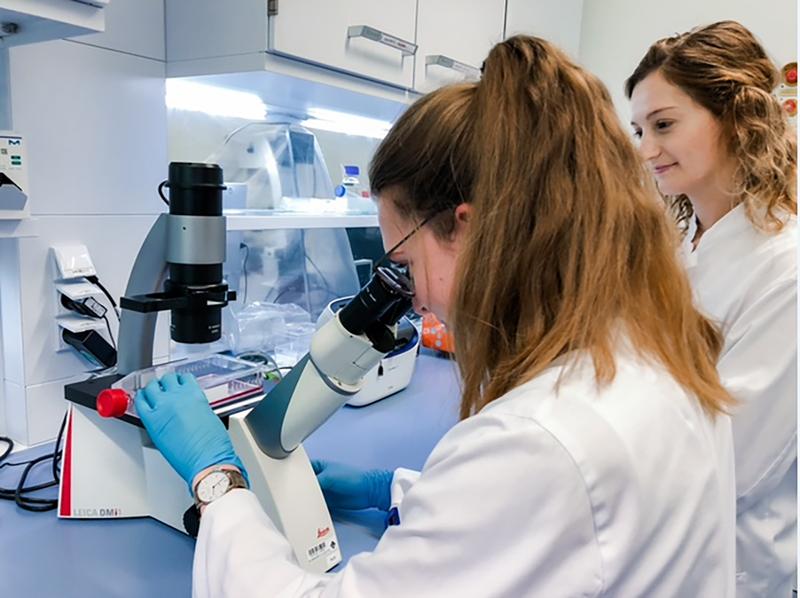
Breakthrough in Rhabdoid Tumor Treatment by Augsburg Researchers

Scientists from the Experimental Paediatric Oncology and Tumour Epigenetics Unit.
(c) University of Augsburg
An international research team with the significant involvement of Augsburg University Medicine has made significant progress in the risk assessment and treatment of extracranial malign rhabdoid tumours. Recently published in the renowned journal “Clinical Cancer Research,” the study, “Clinical and Molecular Risk Factors in Extracranial Malignant Rhabdoid Tumours: Toward an Integrated Model of High-Risk Tumours,” shows how clinical and molecular factors can influence disease progression and contribute to improvements in individual treatment.
Malign rhabdoid tumours are rare and affect around 35 children a year in Germany, in particular infants and toddlers. Due to the aggressive nature of the disease and the high rate of recurrence in this type of cancer, treatment is often difficult. As there has been no established model of prognosis for these tumours up until now, there has often been a lack of targeted treatment options that consider individual disease progression. The new research results now enable a more precise assessment of the risk and of individually adapted therapies that increase the chances of recovery for young patients.
A thorough molecular analysis was conducted in the study in which the research team analysed the genetic and epigenetic composition of the tumours. Data from a total of 213 patients from the EU-RHAB register was used. Through the analysis of tumour DNA and a modern machine learning process, the team were able to identify three subgroups with different risk profiles: a subgroup with improved chances of survival (“eMRT standard risk”) and two subgroups with increased risk of recurrence. These subgroups should support clinical decision-making by the early identification of high-risk patients.
Professor Dr med. Pascal Johann, one of the leaders of the study at the University Hospital Augsburg, and professor for experimental paediatrics at the Faculty of Medicine, explains: “Our research results show that clinical as well as genetic factors have a significant influence on disease progression.” Professor Dr Dr med. Michael C. Frühwald, director of the Swabian Children’s Cancer Centre and co-author of the study, adds: “This study represents an important step towards personalised medicine in the treatment of children with malign rhabdoid tumours. Through a better understanding of the risk factors, we want to increase the chances of therapeutic success and the chances of recovery for seriously ill children.”
On behalf of the study, the two first-authors, Victoria E. Finke and Mona Steinbügl, were recently awarded a prize for outstanding scientific publications by the Dr. Wolfbauer-Stiftung in the context of the University Hospital Augsburg’s 2024 Science Day.
In addition to pure research, the University Hospital Augsburg is also running the clinical study EURHAB, which is specifically concerned with the research and treatment of rhabdoid tumours. As a European Assistance Centre for all cases of rhabdoid tumours, the University Hospital Augsburg plays a central role in the further development of individual treatment strategies for this serious disease and is actively committed to the further development of therapeutic options and improvement in the prognosis of affected children.
Wissenschaftliche Ansprechpartner:
Prof. Dr. Pascal Johann
Professor of Experimental Paediatrics
Telefon: +49 821 400-9201
pascal.johann@uk-augsburg.de
Originalpublikation:
Clinical and Molecular Risk Factors in Extracranial Malignant Rhabdoid Tumors: Toward an Integrated Model of High-Risk Tumors.
Clinical Cancer Research – AACR Journals
Authors: Victoria E. Fincke, Mona Steinbügl, Hye-Jung E. Chun, Karolina Nemes, Marlena Mucha, Maurice Loßner, Felix Dorn, Katharina Gastberger, Sebastian Bühner, Martin Sill, Thomas Kröncke, Reiner Siebert, Patrick Melchior, Rhoikos Furtwängler, Matthias Schlesner, Christian Vokuhl, Christoph Röcken, Pascal D. Johann, Michael C. Frühwald











![“[The discovery] ticks all the boxes of everything we’ve been looking for,” says Avtar Roopra (right), seated with research collaborator Olivia Hoffman. Credit: UW–Madison](https://www.innovations-report.com/wp-content/uploads/2025/03/Could_an_arthritis_drug_unlock_lasting_relief_from_1742985532-e1742985808827-362x245.jpg)


